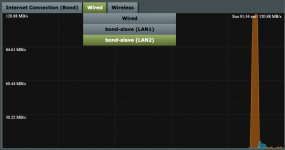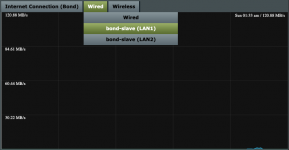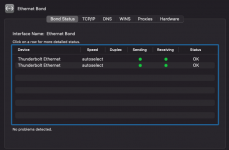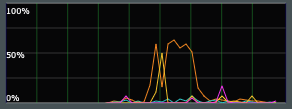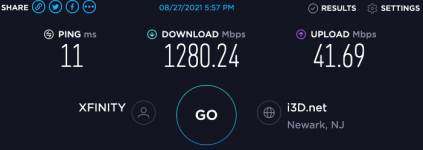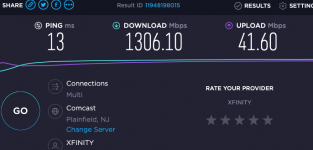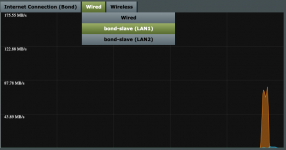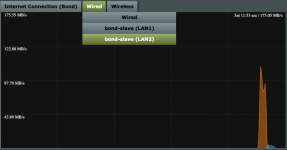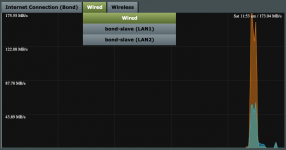I was having an issue with throughput speed through my RT-AX88U router that I posted in another thread. However I since upgraded the firmware of my router to Merlin's version 386.3_2 and it sparked a new issue. I figured I'd give this forum a shot.
Just a quick rundown of my setup:
SB8200 -> WAN LAGG Port WAN & 4 -> RT-AX88U -> LAN LAGG Port 1 & 2 -> 2x Thunderbolt to Gigabit Ethernet -> 2018 MacBook Pro
When connecting my computer directly up to the modem (Also using LAGG) I can hit almost 1200 Mbps. However when hooked up through the router I only achieve 800 - 930 Mbps.
Using the traffic monitor built into the GUI of the router I can see the LAN 2 is doing all the receiving and LAN 1 is doing most of the sending of data sometimes. LAN 1 is barely doing anything at all. The bond is good on both ends. This is a different behavior than the stock firmware as it was balanced before. (Rx/Tx was almost identical between the two ports)
I've even physically swapped the wires but the behavior remains the same. Down on L2 and up on L1. So I think this is indicating the router is deciding this behavior.
Is there a balancing setting somewhere? I'm assuming it would have to be command prompt through SSH if it exists. I've gone through almost all the menus two or three times now looking for something.
The problem with the stock firmware before was when it was balancing the load between the two ports it was maxing out around 750 Mbps. If i disconnected one of the links it would hit 940 Mbps (About the max for 1 GbE port).
It's a bit aggravating because I know from hooking up to the modem directly I could have higher speeds. The router as powerful as it is, is bottlenecking me here.
Here is the output from bond0 which appears the be the LACP link to my computer. I don't see anything out of the norm here to indicate why it's prioritizing the LAN 2. Unless is it normal for both eth interfaces to have the same 'Permanent HW addr'?
Also I'm leaning towards the issue may possible be related to 'Aggregator selection policy (ad_select)' setting being it's set to 'count' apposed to 'stable' or 'bandwidth'. Or perhaps something with 'xmit_hash_policy' But I'm probably totally wrong being the WAN bond seems to be configured the sameway but seems more balanced (See below)
This is bond0 (The LAN bonding, bond1 is the WAN bonding)
Being there is no seperation of the WAN bond on the GUI, a spit out from ifconfig shows the WAN bond (eth0, eth1) appears to be somewhat balanced. But the LAN bond (eth3, eth4) seems to be favoring eth4 for TX and eth3 for RX.
Bottom line: Flashing to Merlin has degraded my overall throughput over the LAN to WAN LACP links. Before on stock firmware every once in awhile I would hit 990+ Mbps. It rarely goes above 870 Mbps now. Also it's primarily using one link for download and roughly 50/50 for upload instead of both being 50/50 like before on stock firmware.
Just a quick rundown of my setup:
SB8200 -> WAN LAGG Port WAN & 4 -> RT-AX88U -> LAN LAGG Port 1 & 2 -> 2x Thunderbolt to Gigabit Ethernet -> 2018 MacBook Pro
When connecting my computer directly up to the modem (Also using LAGG) I can hit almost 1200 Mbps. However when hooked up through the router I only achieve 800 - 930 Mbps.
Using the traffic monitor built into the GUI of the router I can see the LAN 2 is doing all the receiving and LAN 1 is doing most of the sending of data sometimes. LAN 1 is barely doing anything at all. The bond is good on both ends. This is a different behavior than the stock firmware as it was balanced before. (Rx/Tx was almost identical between the two ports)
I've even physically swapped the wires but the behavior remains the same. Down on L2 and up on L1. So I think this is indicating the router is deciding this behavior.
Is there a balancing setting somewhere? I'm assuming it would have to be command prompt through SSH if it exists. I've gone through almost all the menus two or three times now looking for something.
The problem with the stock firmware before was when it was balancing the load between the two ports it was maxing out around 750 Mbps. If i disconnected one of the links it would hit 940 Mbps (About the max for 1 GbE port).
It's a bit aggravating because I know from hooking up to the modem directly I could have higher speeds. The router as powerful as it is, is bottlenecking me here.
Here is the output from bond0 which appears the be the LACP link to my computer. I don't see anything out of the norm here to indicate why it's prioritizing the LAN 2. Unless is it normal for both eth interfaces to have the same 'Permanent HW addr'?
Also I'm leaning towards the issue may possible be related to 'Aggregator selection policy (ad_select)' setting being it's set to 'count' apposed to 'stable' or 'bandwidth'. Or perhaps something with 'xmit_hash_policy' But I'm probably totally wrong being the WAN bond seems to be configured the sameway but seems more balanced (See below)
This is bond0 (The LAN bonding, bond1 is the WAN bonding)
Code:
admin@RT-AX88U:/proc/3081/net/bonding# cat ./bond0
Ethernet Channel Bonding Driver: v3.7.1 (April 27, 2011)
Bonding Mode: IEEE 802.3ad Dynamic link aggregation
Transmit Hash Policy: layer3+4 (1)
MII Status: up
MII Polling Interval (ms): 100
Up Delay (ms): 0
Down Delay (ms): 0
802.3ad info
LACP rate: fast
Min links: 0
Aggregator selection policy (ad_select): count
Active Aggregator Info:
Aggregator ID: 1
Number of ports: 2
Actor Key: 9
Partner Key: 1
Partner Mac Address: f0:XX:XX:XX:XX:f7
Slave Interface: eth3
MII Status: up
Speed: 1000 Mbps
Duplex: full
Link Failure Count: 32
Permanent HW addr: a8:XX:XX:XX:XX:20
Slave queue ID: 0
Aggregator ID: 1
Actor Churn State: none
Partner Churn State: none
Actor Churned Count: 0
Partner Churned Count: 16
details actor lacp pdu:
system priority: 0
port key: 9
port priority: 255
port number: 1
port state: 63
details partner lacp pdu:
system priority: 32768
oper key: 1
port priority: 32768
port number: 4
port state: 189
Slave Interface: eth4
MII Status: up
Speed: 1000 Mbps
Duplex: full
Link Failure Count: 33
Permanent HW addr: a8:XX:XX:XX:XX:20
Slave queue ID: 0
Aggregator ID: 1
Actor Churn State: none
Partner Churn State: none
Actor Churned Count: 17
Partner Churned Count: 17
details actor lacp pdu:
system priority: 0
port key: 9
port priority: 255
port number: 2
port state: 63
details partner lacp pdu:
system priority: 32768
oper key: 1
port priority: 32768
port number: 5
port state: 189Being there is no seperation of the WAN bond on the GUI, a spit out from ifconfig shows the WAN bond (eth0, eth1) appears to be somewhat balanced. But the LAN bond (eth3, eth4) seems to be favoring eth4 for TX and eth3 for RX.
Code:
admin@RT-AX88U:ifconfig
bond0 Link encap:Ethernet HWaddr A8:XX:XX:XX:XX:20
inet6 addr: fe80::XXXX:XXXX:XXXX:XXXX/64 Scope:Link
UP BROADCAST RUNNING ALLMULTI MASTER MULTICAST MTU:1500 Metric:1
RX packets:274878609111 errors:0 dropped:0 overruns:0 frame:0
TX packets:292061354549 errors:0 dropped:4294967295 overruns:0 carrier:0
collisions:0 txqueuelen:0
RX bytes:270782263975 (252.1 GiB) TX bytes:283944929931 (264.4 GiB)
bond1 Link encap:Ethernet HWaddr A8:XX:XX:XX:XX:20
inet addr:73.XX.XX.33 Bcast:73.XXX.XXX.255 Mask:255.255.254.0
inet6 addr: XXXX:XXX:XXXX:XX:XXXX:XXXX:XXX:XXXX/128 Scope:Global
inet6 addr: fe80::XXXX:XXXX:XXXX:XXXX/64 Scope:Link
UP BROADCAST RUNNING ALLMULTI MASTER MULTICAST MTU:1500 Metric:1
RX packets:50844481 errors:0 dropped:0 overruns:0 frame:0
TX packets:4316426183 errors:0 dropped:0 overruns:0 carrier:0
collisions:0 txqueuelen:0
RX bytes:63495128204 (59.1 GiB) TX bytes:13758449827 (12.8 GiB)
br0 Link encap:Ethernet HWaddr A8:XX:XX:XX:XX:20
inet addr:192.168.1.1 Bcast:192.168.1.255 Mask:255.255.255.0
inet6 addr: XXXX:XX:XXXX:XXXX::X/64 Scope:Global
inet6 addr: fe80::XXXX:XXXX:XXXX:XXXX/64 Scope:Link
UP BROADCAST RUNNING ALLMULTI MULTICAST MTU:1500 Metric:1
RX packets:22238119 errors:0 dropped:0 overruns:0 frame:0
TX packets:50943383 errors:0 dropped:0 overruns:0 carrier:0
collisions:0 txqueuelen:0
RX bytes:9233627966 (8.5 GiB) TX bytes:63414801229 (59.0 GiB)
eth0 Link encap:Ethernet HWaddr A8:XX:XX:XX:XX:20
UP BROADCAST RUNNING SLAVE MULTICAST MTU:1500 Metric:1
RX packets:33015624 errors:0 dropped:0 overruns:0 frame:0
TX packets:15677184 errors:0 dropped:0 overruns:0 carrier:0
collisions:0 txqueuelen:1000
RX bytes:40099380129 (37.3 GiB) TX bytes:7656874873 (7.1 GiB)
eth1 Link encap:Ethernet HWaddr A8:XX:XX:XX:XX:20
UP BROADCAST RUNNING SLAVE MULTICAST MTU:1500 Metric:1
RX packets:17828860 errors:0 dropped:2 overruns:0 frame:0
TX packets:5781732 errors:0 dropped:0 overruns:0 carrier:0
collisions:0 txqueuelen:1000
RX bytes:23395748435 (21.7 GiB) TX bytes:1806611615 (1.6 GiB)
eth2 Link encap:Ethernet HWaddr A8:XX:XX:XX:XX:20
inet6 addr: fe80::XXXX:XXXX:XXXX:XXXX/64 Scope:Link
UP BROADCAST RUNNING ALLMULTI MULTICAST MTU:1500 Metric:1
RX packets:2428107 errors:0 dropped:0 overruns:0 frame:0
TX packets:4554473 errors:0 dropped:0 overruns:0 carrier:0
collisions:0 txqueuelen:1000
RX bytes:326056859 (310.9 MiB) TX bytes:3920580547 (3.6 GiB)
eth3 Link encap:Ethernet HWaddr A8:XX:XX:XX:XX:20
UP BROADCAST RUNNING ALLMULTI SLAVE MULTICAST MTU:1500 Metric:1
RX packets:463770 errors:0 dropped:0 overruns:0 frame:0
TX packets:81907 errors:0 dropped:1569 overruns:0 carrier:0
collisions:0 txqueuelen:1000
RX bytes:152456236 (145.3 MiB) TX bytes:23226299 (22.1 MiB)
eth4 Link encap:Ethernet HWaddr A8:XX:XX:XX:XX:20
UP BROADCAST RUNNING ALLMULTI SLAVE MULTICAST MTU:1500 Metric:1
RX packets:238397 errors:0 dropped:0 overruns:0 frame:0
TX packets:3496514 errors:0 dropped:22270 overruns:0 carrier:0
collisions:0 txqueuelen:1000
RX bytes:46868091 (44.6 MiB) TX bytes:4748829392 (4.4 GiB)Bottom line: Flashing to Merlin has degraded my overall throughput over the LAN to WAN LACP links. Before on stock firmware every once in awhile I would hit 990+ Mbps. It rarely goes above 870 Mbps now. Also it's primarily using one link for download and roughly 50/50 for upload instead of both being 50/50 like before on stock firmware.
Attachments
Last edited:


